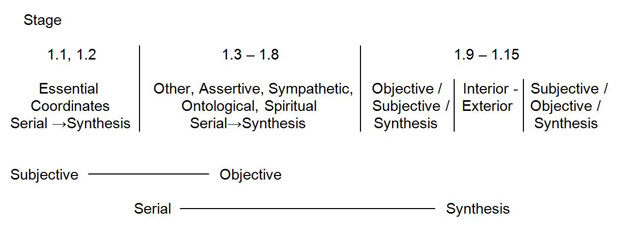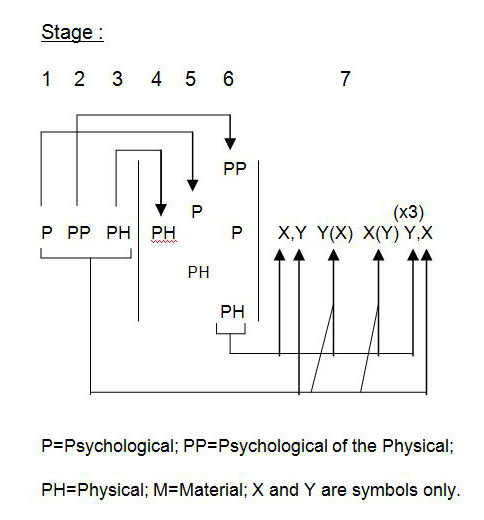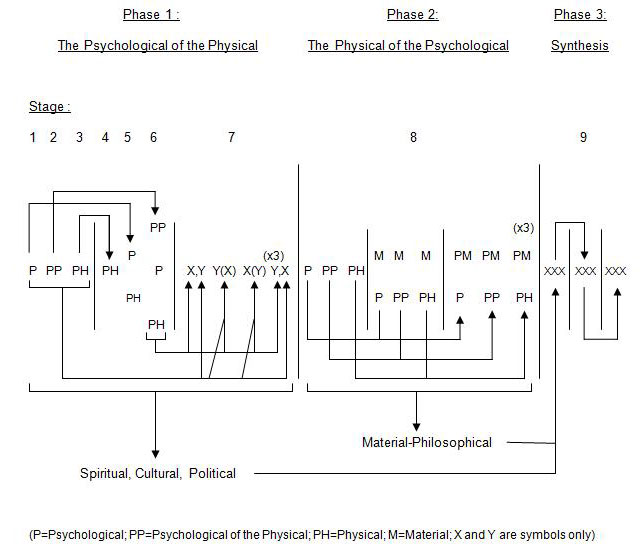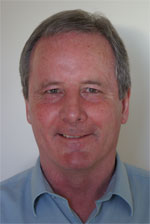Spirit Dialectic
abracad, · Categories: externally authored, spiritualityby Donald MacPhie
Something amazing happened to me – the experience of a remarkable phenomenon and possibility of human consciousness. It took place over a considerable time, approaching two decades. Its structural aspects are intriguing, and integrally linked to the substance, which is existentially inclusive.
The precise starting point is not clear. I had a distinct affection for nature as a child; at puberty, this translated to a passion for social justice, expressed as naive communism. At this time, the mid-to-late sixties, I was of course influenced by the ‘alternative’ culture of rock music, and writers like Kerouac; from mid- to late teens I read about Sartre, Freud, RD Laing, and Marx; I left university during the first year of a social anthropology degree course, feeling it lacked a sense of direction (I later felt vindicated in this by remarks to this effect by Eric Fromm, in ‘The Anatomy of Human Destructiveness). Through the writings of John Prebble I became disturbingly  aware of the history and culture of Gaelic Scotland, where my parents originated, and which had been largely ignored by the Scottish educational system. The clash of clan-system and capitalism produced a sense of trans-historic perspective. I was seriously inspired by Che Guevera, and very interested in Buddhism. Coping with all these apparently oppositional world-views, had brought an image to mind of trying to hold teams of wild horses pulling in opposite directions. Drifting between manual work and periods of unemployment, I began to write my thoughts purely for self-clarification.
In my early twenties, the outcome of this discomforting ferment, of the above ‘Essential Coordinates’, was a ‘Declaration’ of which the essence is: following the distillations of Marx, Sartre (including his later works), neo-Freudianism, Social Anthropology, Buddhism,  our essential identity is sentience, an innocent, infinite capacity to feel; the empirical feeling of sentience for identity, in other life, as opposed to the ‘inert’ universe, is infinite joy of absolute perfection of identity, the innocent infinite capacity to feel; and while we exist in relation to the senses through sensual creativity, the greatest joy in the context of suffering others is to liberate them from that suffering (within the limits of the possible.) This sense of the empiricism of human feeling may have been influenced by David Hume’s ideas on the empiricism of human sympathy.  I was excited by this resolution of ideas, to the extent of writing it out, and showing it to friends.
After this I worked for a time in a jute mill in Dundee, I recall reading and writing during my breaks. The ‘Declaration’ above now confronted the world of the Other , relativising the foregoing. The self-identity of the Other was seen as a fabrication produced by the procrustean bed of family, class, the education system, religious institutions, the State; resulting in the negation of the freedom and responsibility of the Other to determine their own being, and to project this negation onto freedom, as evil. Relation to the Other was explored through  successive dimensions of self-assertion, compassion, the existential, the spiritual. This period, whilst developmentally integral, had a feeling of stagnation, until its key resolution in the spiritual determinance of self-Other relation.
Both these two stages (Self serial → syntheses; Other serial → syntheses), now form the elements of a third stage, with a transformative synthesis of the first two stages developing unknowingly out of a sense of paralysis. It began with a spontaneous sense of the need for a stock-take or inventory of the contents of consciousness. There followed a  with consideration of objective factors of the human developmental dialectic, guided by RD Laing and DG Cooper’s ‘Reason and Violence’, ( subtitled, ‘A Decade of Sartre’s Philosophy, 1950 – 1960). Pre-verbal unconscious phantasy of infancy, combine with the para-verbal, and with the unconscious phantasy systems of the family, and uncritical pre-dispositions of class and culture, in a progressive interiorisation of exterior / exteriorisation of interior. Contradictions in the mediation of family, class and culture may mean the objective determinants and subjective matrix become themselves objects of praxis. There also developed a re-synthesis of the nature of dialectical process, heavily influenced by Laing on Sartre; and a re-synthesis of the various conceptual elements of the originating ’Essential Coordinates’, above. There was also a tentative, nascent articulation of present thought as dialectical – categories of ‘Concrete Thought’ - this expressing experienced need for a conceptual activity ; ‘Concrete Intellect’ – this a reflection on the nature of developing conceptual activity; ‘General Intellect’ – integration of general systems of ideas. These categories interact, and eventually develop an embryonic cyclic structure, which would become the framework of subsequent development.
The second moment of this key third stage, was, on the basis of ‘phenomenological description informed by experience and general theory’, the application of the developmental ideas above to myself, as subject – my personal development.  Again I used a  method pointed to in RD Laing and DG Cooper’s ‘Reason and Violence’. This was the retro-progressive analytic-synthetic method used by Henri Lefebvre in social history; and the dialectical method used by Sartre on his work on Genet..
The third moment of this third stage was one of further synthesis – (1) reciprocal inter-criticism of all systems of thought : x(abcdefg) / abcdefg(x) – thus reflecting the interdependence of spheres of being. (2) General Praxis – aspirations to follow the path of Che Guevera were deflected by the awareness that Scotland had become the store of UK nuclear weapons, and  as such a prime nuclear target; also blighted by nuclear production and pollution risks, by locations and sea currents. I also still had thoughts of training. for Zen Buddhism. Reflections on the pre-modern passion that created Scotland, led me to consider that violence might be a legitimate self-defence in these circumstances, contrary to recent Scottish adherence to legalism. (3) Self-Other – a general resynthesis of issues of ‘reciprocally self-conscious intersubjectivity’, in conflict with conformity; reflections on sexuality and feminism.
Passing over some structural complexity of this stage, a further moment of this  third stage yielded a ‘ten year’ re-synthesis: again, the (Self serial → syntheses; Other serial → syntheses) sense of stagnation replaced by the freedom and strength of realising all this, including primary existential inter-subjective tensions with conformist Others, was ontologically chosen. There was a sense of flowering, and a converse  illumination of the past, the perceptual relativity and logical progression of earlier stages as necessary and natural: the ‘essential coordinates’ were only subjective, in existential terms, requiring completion by the objective, the Other.
There was also a growing articulation of a cyclical dialectical pattern to thought – but ‘thought’ here, being the listening to the still, quiet voice within; a kind of Buddhist Mindfulness (influenced by Nyaponika Thera – the Burmese Satipatthana method) – mindful of mind itself; not manipulative, but receptive and seeking maximum subjective-objective openness. The cyclic pattern was typically articulated by the development of ‘re-reflective reason’ – the notation ‘RR’ routinely used throughout subsequent dialectic, as the dialectic reflects upon and interprets its own progress and structure; self became ‘subject’.
The exact structure of the above material is as follows – in terms of the whole dialectic, the three stages above together comprise Stage 1:

In the developed form of the cyclic dialectic, each cycle is a unique physiological experience, often vividly expressed – here is a brief general sketch. The ending of one cycle may be marked by a sense of tiredness, a desire for oblivion. This is a physical and mental tiredness, at times even marked by sleep. The beginning of a new cycle may be experienced as peace, freshness, cleansed, relaxed; a sense of being on a new level of subjective being. There may then follow a crises of orientation, at this elaboration of the dialectic may be unforeseen to varying degrees; and, as an externalization if this internal crisis, perhaps social vulnerability. Then there is a sense of the ‘progressive’ dialectic, experiencing the power and significance of the preceding dialectical ‘column’, now enhanced by the previous totalisation / synthesis; new reflections on its structural logic; feelings and symbolism relating to the positive wholeness of this possibly involving general cultural reflections. There is usually an ‘internal→external’ expression of this – for example a sense of vigour, robustness, and self-confidence. Then there is the key, subjective-objective synthesis, or totalisation – an ‘objective resolution’ of the subjective cycle, when freely arising subjective impulse is exposed to and fuses with the objective field. This can cover any aspect of subjective being; it is generally rational, but often experiential, occasionally symbolic. Again there may be ‘internal→external’ expression, as previously, including symbolism and aesthetic reflection. There may also be a distinctive definition of the chronology of the process; and of ‘feminine’ sense of related suffering of the process, and a ‘masculine’ sense of conquest. There is often a distinct sense of ‘laying down’ the totalisation that has been completed; a sense of detachment, seeing it as an object, now part of the rest of the ‘objectified’ dialectic. Then reflections on the structure of this, now, ‘new’ – newly elaborated – dialectical column. This can include a distinctive, qualitative ‘parts-whole’ transformation, where a new totalisation not only extends the dialectic by elaboration, but also inter-conditions and transforms the pre-existent components of the dialectic, as they are now constituent elements defined by a new whole. This process can extend back to perceptions of childhood and infancy; in short – transforming the whole ‘developmental-dialectical’ identity of the subject. As with the ‘progressive’ perception of the dialectical column, which preceded the totalisation, an ‘internal→external’ sense of robustness diffuses from inner being to relation to others. Reflections of a more general cultural nature, reflecting the ‘wholeness’ of this cyclic locus, may also occur here.
The cycles generally form triadic structures; the triad is the basis (though not exclusively) of the whole dialectic, at both micro- and macro-levels: threefold structures within threefold structures, often of considerable complexity. Three-ness pervades Western thought, for example, Plato's Beauty, Goodness and Truth; Christian Father, Son and Holy Ghost; the Celtic representation of personalities in triple form and three spots to represent the holy; the dialectic of modernity itself : thesis, antithesis, synthesis. In this dialectic, whether within stages or comparing stages, initial elements of a triad are usually of greater substance, duration and structural complexity; these aspects proportionately reduce as the stage 'accelerates' toward its endpoint. The threefold elaboration may constitute a relative emphasis of for example past/ present/ future, or, retro/ positive/ progressive (‘positive’ in a philosophical sense of unqualified present existents); or, subjective/ objective/ synthesis. At particular stages of the whole, certain intricate symbolic-experiential structures, or ‘effects-flows’ as I have called them, evolve and seem to mediate conceptual resolution into subjective-experiential wholeness.
Far from being volitional or manipulated, my conscious mind generally willed the conclusion of the process, and chronically erred in believing it to be, or about to be, concluded. Indeed, this whole dialectic, from its arising, in the pre/trans-consciousness, to its completion, as a macro-micro triadic structure of a precise and intricate profusion – was generally met by the ego with confusion, disorientation, and exasperation; countlessly wishing and willing the conclusion of the process, but unable to contrive an artificial ending, as this would negate the integrity of my own being, and my full rational-experiential relation to Being. This receptive ‘waiting’ for the work of this trans-personal reality to be completed has a spiritual aspect, sacrificial of the need for subjective resolution, and social and vocational fulfilment. The whole phenomenon became to be experienced as a miraculous, marvellous, white-light jewel crystallisation in subjective consciousness; and yet not in self-conceit; it was the fruit of full psychological relation of my being to Being – it was not my creation, it came through my confusion, and came to be experienced in a receptive sense as the work of a greater power.
From the platform of this third transforming stage above flows the subsequent dialectic. The three foregoing stages are depassed (Sartre’s term for the dialectically inevitable fate of any synthesis: to be overtaken or superseded) and relativised as only the first, or Psychological, phase (P below); in a triad that would comprise two further elements: the Psychological of the Physical (PP) ; and the Physical (PH). Then: progressively, serial-synthesis, and then full Synthesis of these three stages - we may denote this as follows:

Then, in turn, all this foregoing (Serial: Serial-synthesis; Synthesis), is relativised as only the first macro-Phase, Psychological of the Physical, by a second, ‘inverse’  macro-Phase, Physical of the Psychological. Then: the third and final macro-Phase: Synthesis. Thus:

The second or middle phase of the overall structure, 'the Physical of the Psychological', produces an opposite perspective, within which, philosophy is related to the materiality of being. Psychological and physical can be conceived as spirit and matter; this whole dialectic can be seen as the spiritual unity of the subject with Being, as Being or matter becoming conscious of itself through that part of itself which is the subject's consciousness and through history. In this perspective, authentic knowledge is a living, spiritual transition in the selfconscious, self- realisation of that greater Being of which we are part. Finally, the third element of the whole, synthesizes the previous two.
It is difficult to capture in a short article, the precise, intricate profusion, and integration of the macro-micro structure of this ‘transpersonal, self-constituting dialectic of consciousness – to ‘normal’ consciousness, ‘miraculous’ is not an excessive term. . It is similarly difficult to convey the existential fullness of the dialectic – everything from the immediacy of self – Other, material, political, cultural context,  to romantic-erotic symbolism of relation to Being.
Thus the entire Psychological relation to Being, which lasted some eighteen years, can be seen to comprise an interplay between psychological-physical; subjective-objective; spirit-matter; being-Being; until a final unity is reached. The first phase of the macro-triad concludes that whereas spiritual organisation is necessary in society, the political and cultural basis have primacy over the church. The second phase concluded that this subjective consciousness was matter/energy, or Being, dialectically coming to self-consciousness through organic evolution and the philosophical tradition. In the third phase the dimension of ‘self-conscious matter’ of Phase 2 changes the spiritual-cultural/political balance of Phase 1. It conserves the vital significance of social organisation of the spiritual, and of the political-cultural; but relativises the latter and enhances the former through the new responsibility of socially disseminating the reality of this 'self-conscious matter'. However it also affirms the spiritual, political and cultural as an integral unity, essentially common elements of a whole that transcends the particularity of context and praxis. It identifies the philosophical character of this spiritual experience that transcends religious traditions; but asserts as vital, the integration of this subjective experience with religious tradition, the social organization of religion, and the necessity of the physical act of worship. Thus, while this work is based on  a sense of optimal range of objectivity, incorporating the ‘masters of suspicion’ - Marx, Freud, and Nietzsche (via Sartre) – as well as Eastern, Celtic and social anthropological parameters; and while its structure embodies ‘transpersonal’ ordering of consciousness of remarkable intricacy, and of which the holistic qualities extend to the physiological experience – its greatest and most complete moments, are authentic affirmations of modern Christianity – an authentic sense of dependence and gratitude; a flame that becomes soul, grace, law and worship; a need to integrate with religious tradition – in my own case, Celtic Christianity (interesting also in its relatively ‘eastern’ aspects,  and also micro/ intricacy in art and music); the need for physical act of worship, the need spiritual organisation in one’s community; the truth of love, and joy.; and, again, the vital need for integration with religious tradition and social organisation.  In short, a ‘postmodern’ affirmation of Christianity, based on the full scope and expression of ‘postmodern’ subjectivity and self-awareness.
Since the conclusion of this experience, I spent some years editing the copious long-hand notes of its process, and pursuit of publication eventually resulted in self-publishing with Lulu Publishing of ‘Spirit Dialectic’. This article is an attempt to continue the communication of this experience – I feel a responsibility to bring it to the attention of the world, as something that is true and ultimately God-given. I also completed degrees in Divinity and Arts, but withdrew from training in ministry and teaching to focus on the promotion of this work (much to the exasperation of my wife.) I am presently a church officer and elder in the Church of Scotland, and involved in community projects such as the funding of a drugs support worker; a community cafe; and a music and dance club, set up following suicides of local youths. I had approached training as an auxiliary minister, which I hope to resume shortly. My underlying task remains the struggle to communicate the truth and reality of this extraordinary experience.
~ ~ ~ ~ ~ ~ ~ ~ ~
About the author

I was born in 1954 in Edinburgh, the experience described in this work, and subsequent efforts at publication, including much editing of the voluminous original materials, and re-editing and re-drafts, has effectively been my life’s work to date.
I am a Bachelor of Divinity and Master of Arts from Edinburgh University, but to date an intended Church vocation has been on hold due to a sense of an imperative to effectively communicate this work. I am at present a Church Officer and Elder in the Church of Scotland, and involved in local issues in Lochee, a community within Dundee, which is the city I have mostly lived in. I work as a civil servant.
I am deeply indebted to my wife May for her support and forbearance during the years of sacrifices and costs involved in my commitment to this work.
For further information, see www.spiritdialectic.com, where Spirit Dialectic can be downloaded free, or ordered in paperback.
See also:
Filed in: externally authored, spirituality

Leave a Reply